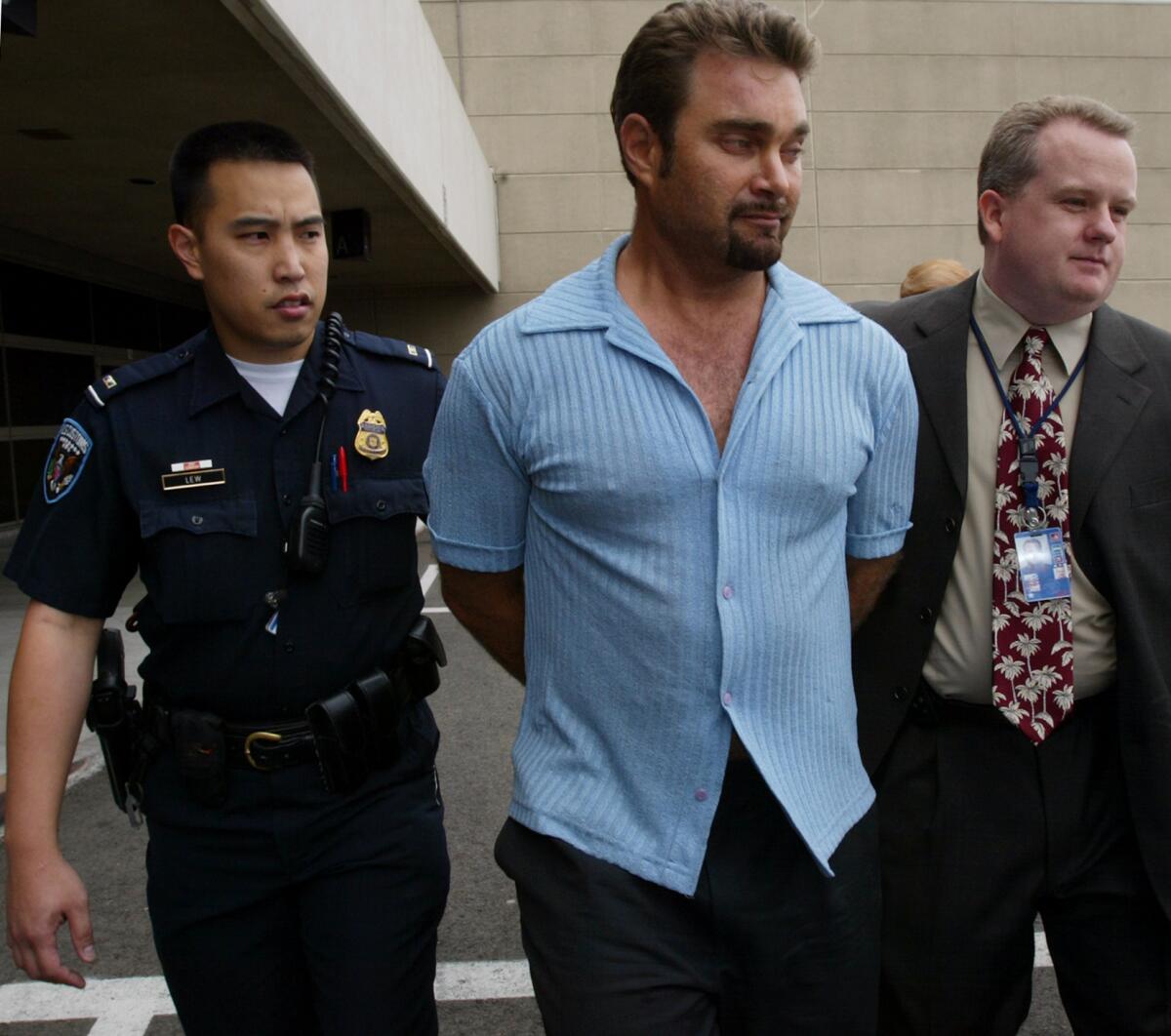Parole board halts early release of serial rapist, heir to cosmetics fortune

- Share via
The California Board of Parole Hearings reversed a decision made in August to allow the early release of Andrew Stuart Luster, a serial rapist who drugged young women in college bars during the late 1990s and later was captured by a bounty hunter when he fled to Mexico to avoid his trial.
Luster, a great-grandson of cosmetics giant Max Factor, was convicted in 2003 of 86 felony counts, including poisoning, rape, sodomy and oral copulation of unconscious victims. He is now 60 years old.
In August, a two-person parole panel deemed him eligible for early release — a decision that Ventura County Dist. Atty. Erik Nasarenko believed was based on erroneous facts surrounding Luster’s offenses.
“Commissioners ignored consistent, blatant misrepresentations the inmate made about his crimes,” Nasarenko wrote in an October letter to the board. “The commissioners failed to prepare questions based on these misrepresentations and demonstrated through their questioning they were ill prepared to investigate the inmate’s lack of understanding and insight into the factors that led to his 86 felony convictions.”
The full Board of Parole Hearings panel recently reviewed a list of these alleged errors provided by Nasarenko and reversed the parole decision. Luster is tentatively scheduled for another parole hearing in 2025.
Senior Deputy Dist. Atty. Tony Wold, who prosecuted the original case against Luster, said the district attorney’s office intends to ensure that he serves the remaining two years of his term.
A case against an imprisoned member of the Westside Riva gang suggests that some criminal groups have tried to add pornography and illegal gambling to their revenue streams.
“In my 27 years as a prosecutor, Luster remains one of the most dangerous rapists I have ever prosecuted,” Wold said in a statement.
If he is not paroled sooner, Luster is scheduled to be released on Oct. 31, 2026.
From 1996 to 2000 Luster used the illegal drug gamma-hydroxybutyrate, or GHB, to put his victims in a “life-threatening state of unconsciousness” and engage in “sadistic sexual abuse of their comatose bodies,” according to the D.A.’s office. Footage that Luster recorded of two of these rapes was used against him in court.
The case attracted intense media attention when Luster fled to Mexico after paying a $1-million bail in 2003 and was subsequently captured in Puerto Vallarta by American bounty hunter and reality TV personality Duane “Dog” Chapman.
While in Mexico, Luster compiled what he called a “payback list,” with names of Ventura County prosecutors, sheriff’s deputies, his victims and one of his attorneys, according to statements by Judge Kathryne Ann Stoltz.
Luster was sentenced to 124 years in prison in 2003; however, in 2013 that sentence was reduced to 50 years. He has since served 23 of those years, including time spent under house arrest and in pretrial custody, according to the D.A.’s office.
In California, the general rule is that a defendant convicted of a nonviolent felony must serve 50% of their sentence. Luster’s crime, rape of an unconscious person, technically qualifies as a nonviolent offense, Nasarenko explained to KCLU in 2023.
More to Read
Sign up for Essential California
The most important California stories and recommendations in your inbox every morning.
You may occasionally receive promotional content from the Los Angeles Times.



![Stephanie Lazarus, a Los Angeles police detective charged with capital murder in the 1986 slaying of her ex-boyfriend's wife pleaded not guilty during her arraignment in Los Angeles Superior Court Monday morning, July 6, 2009. (AP Photo/Al Seib ,Pool)]](https://ca-times.brightspotcdn.com/dims4/default/189ca94/2147483647/strip/true/crop/2400x1605+0+76/resize/320x214!/quality/75/?url=https%3A%2F%2Fcalifornia-times-brightspot.s3.amazonaws.com%2F65%2Fe0%2F8228b5b44c0da5be07c48647ce71%2Fdetective-killing.JPEG)








